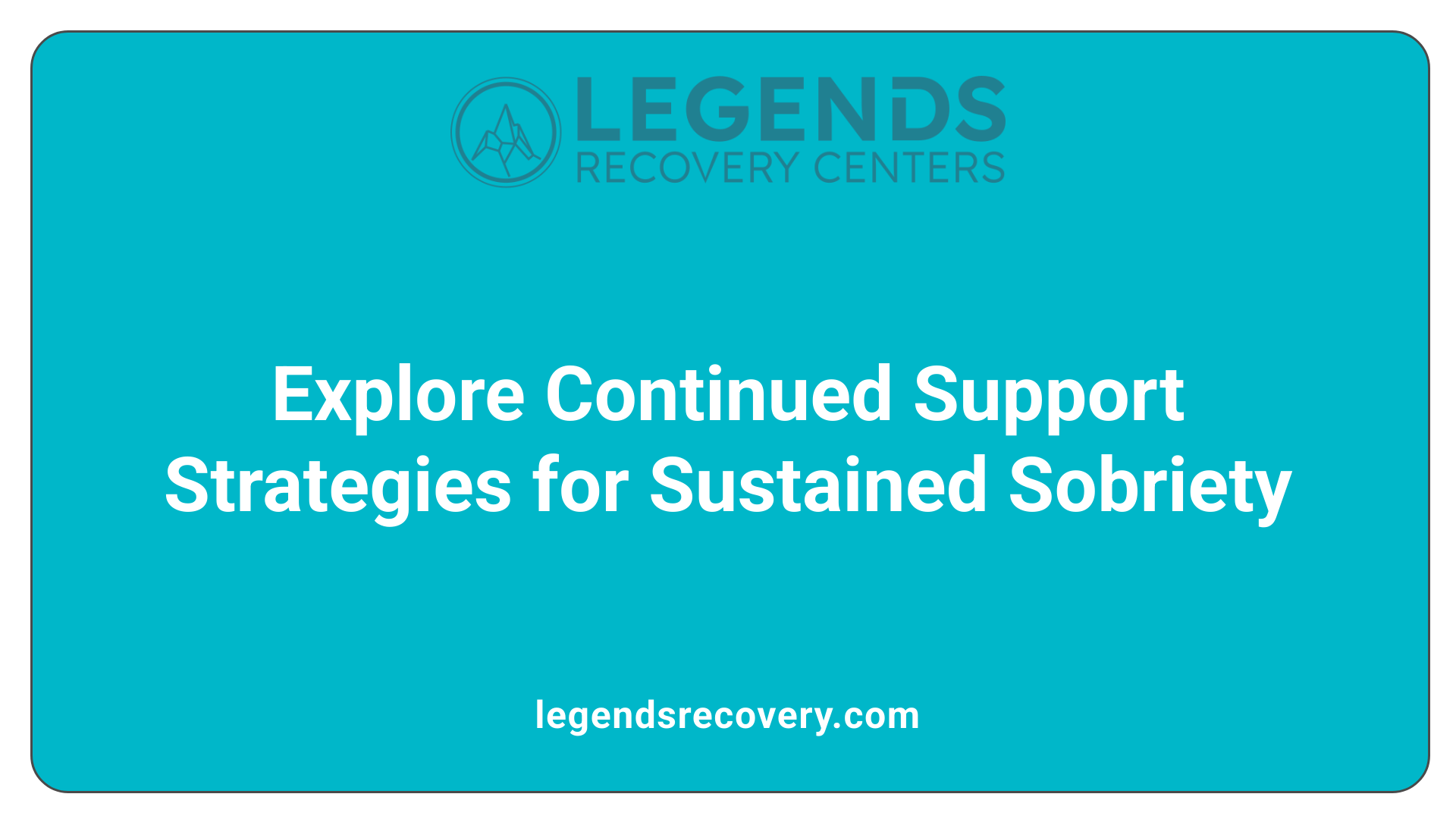Building Bridges to Lasting Sobriety: The Power of Supportive Communities

Long-term sobriety is a multifaceted journey that extends beyond initial treatment. It hinges on robust support systems that foster resilience, provide emotional and practical resources, and cultivate a sense of belonging. Recognizing and leveraging the importance of community and ongoing support can significantly enhance recovery outcomes, helping individuals maintain sobriety and rebuild their lives.

Community building and structured support are fundamental elements in the journey of addiction recovery. They cultivate a sense of belonging, trust, and shared experience, helping individuals remain committed to their sobriety goals. Being part of recovery communities, like mutual help groups, sober living houses, and peer mentoring programs, offers emotional validation and social bonds essential for mental well-being.
Participation in these groups provides access to a network of emotional, informational, and practical resources. This support assists individuals in managing stress, developing coping strategies, and preventing relapse. Feeling connected to others who understand the challenges of recovery fosters hope and resilience, reducing feelings of shame and isolation.
Moreover, such communities reinforce accountability and purpose, encouraging continual growth and learning. Regular interactions with peers help individuals recognize early warning signs of relapse and maintain motivation through shared successes.
Overall, a strong community provides ongoing encouragement, supports emotional health, and enhances the long-term outlook of recovery, making it easier for individuals to build sustainable, fulfilling lives free from substance use.

Aftercare programs encompass a variety of ongoing treatment and support services designed to help individuals maintain sobriety after initial rehab. Common types include outpatient therapy, sober living houses, mutual aid groups like Alcoholics Anonymous (AA), NA, SMART Recovery, and specialized alumni programs. Each component aims to reinforce recovery skills, provide emotional support, and foster accountability.
Outpatient therapy offers flexible counseling options, allowing individuals to access mental health support while living at home. Sober living homes provide a structured, substance-free environment that promotes routine, responsibility, and community engagement.
Support groups such as AA and NA enable members to share experiences, celebrate milestones, and learn relapse prevention strategies. Alumni programs often organize social activities, ongoing education, and peer mentorship to sustain motivation.
Medication-assisted treatment (MAT) and family therapy are also integral elements, targeting biological and relational aspects of addiction. These diverse components work together to create a comprehensive aftercare approach that adapts to individual needs.
Continuous care plays a vital role in preventing relapse by maintaining the progress achieved during primary treatment. Addiction is a chronic condition, and ongoing support helps individuals manage cravings, cope with stressors, and navigate new life challenges.
Regular check-ins, therapy sessions, and support group participation reinforce coping strategies and bolster resilience. They also serve as early warning indicators, enabling prompt intervention if signs of relapse emerge.
Furthermore, continuous care sustains motivation and provides emotional validation, reducing feelings of isolation common in recovery journeys. It helps individuals rebuild and strengthen social connections, which are crucial protective factors.
By offering a structured environment to address setbacks and refine personal coping plans, ongoing care ensures that recovery is a lifelong process rather than a one-time event.
Consistent support significantly increases treatment retention by fostering a sense of accountability and community. When individuals know that help is accessible, they are more likely to stay engaged with their recovery plans.
Support networks—including peers, sponsors, therapists, and family—provide encouragement, reinforce sobriety goals, and celebrate successes, boosting confidence and motivation.
Participation in ongoing programs helps individuals develop new routines and habits aligned with a sober lifestyle. It also offers positive reinforcement through milestone recognitions, which motivate continued effort.
Research shows that people involved in active aftercare are more likely to remain abstinent long-term. Maintaining motivation is easier when individuals feel supported, understood, and connected to others who share similar recovery experiences.
This ongoing engagement builds resilience, enhances self-efficacy, and promotes a proactive approach to managing life’s challenges without substance use.
 Recognizing the foundational elements of recovery, including core principles and various support systems, is vital for anyone seeking to maintain sobriety. Education about these principles equips individuals with the necessary knowledge to actively participate in their recovery process and to make informed decisions that bolster their long-term wellness.
Recognizing the foundational elements of recovery, including core principles and various support systems, is vital for anyone seeking to maintain sobriety. Education about these principles equips individuals with the necessary knowledge to actively participate in their recovery process and to make informed decisions that bolster their long-term wellness.
Recovery principles encompass understanding the importance of social support, developing coping skills, establishing routines, and addressing co-occurring mental health conditions. These core ideas help individuals rebuild their lives, foster resilience, and prevent relapse. For example, participation in mutual help organizations like Alcoholics Anonymous (AA), recovery homes such as Oxford Houses, and support groups including SMART Recovery or Celebrate Recovery offer vital emotional and social resources.
Different types of support—peer groups, family involvement, and professional support—play unique roles. Peer groups create a sense of community, understanding, and shared purpose. Family support provides emotional validation and accountability, often strengthening recovery outcomes. Professional services—including counselors, therapists, and medical providers—deliver tailored therapies, medication management, and holistic care. Access to diverse support options allows individuals to find the most effective tools suitable to their specific recovery needs.
The impact of knowledge about support options extends beyond initial treatment. It directly influences engagement in recovery activities and the overall success in maintaining sobriety. Educated individuals are more likely to utilize available resources, participate in ongoing support programs, and develop lasting habits that promote physical, emotional, and social stability.
In sum, understanding the spectrum of recovery principles and support types increases motivation, encourages sustained participation, and ultimately raises the chances of long-term sobriety. This comprehensive awareness fosters resilience, reduces feelings of isolation, and helps individuals navigate the complexities of recovery with confidence.
| Support Type | Description | Benefits |
|---|---|---|
| Peer-led groups (AA, NA) | Mutual help organizations fostering shared experiences | Emotional support, accountability, long-term abstinence |
| Family involvement | Support from loved ones encouraging substance reduction | Strengthened relationships, motivation, emotional validation |
| Professional support | Therapy, counseling, medication management | Personalized care, relapse prevention, skill development |
| Community programs | Local recovery initiatives, educational services | Community engagement, ongoing learning, resilience building |
| Online resources | Virtual support groups, apps, social media platforms | Accessibility, constant support, community building |
Having a broad understanding of these varied support structures enhances recovery engagement, promotes sustained sobriety, and fosters holistic well-being.

Support networks such as family, friends, and mutual aid organizations are essential for sustained recovery from substance use disorders. They provide emotional encouragement and practical help, which reinforce positive behaviors and foster accountability. Family members can participate actively in their loved one's recovery by attending family therapy sessions or joining support groups like Al-Anon, which focus on understanding and supporting individuals with addiction.
These relationships help improve communication, address dysfunctional family roles, and promote healthier dynamics that create a stable environment for sobriety. Mutual aid groups—like Alcoholics Anonymous, Narcotics Anonymous, and SMART Recovery—offer shared experiences, community, and continual accountability. They serve as a safe space where individuals can access ongoing support, share challenges, and celebrate milestones.
Having a strong support system reduces relapse risks by increasing treatment adherence and emotional resilience. Family and peer involvement not only comfort individuals during struggles but also boost motivation, reinforcing commitment to long-term sobriety. This holistic approach, combining emotional, psychological, and practical support, maximizes the likelihood of maintaining sobriety over the long term.

Building authentic relationships plays a vital role in the journey of recovery from substance use disorders. Genuine connection offers more than just companionship; it provides emotional validation, reassurance, and a sense of belonging that are essential during the challenging process of overcoming addiction.
Supportive relationships with family, friends, and support groups create a strong foundation for motivation. These bonds help individuals feel understood and accepted, which reduces feelings of shame and loneliness that often accompany addiction.
Research shows that strong social ties increase recovery capital—the resources a person can draw upon to sustain sobriety. They also foster resilience, helping individuals cope with cravings, stress, and setbacks.
Early attachment experiences influence vulnerability to addiction, highlighting the importance of positive social bonds from a young age. Conversely, social exclusion can heighten the risk of relapse, emphasizing the need to foster inclusion and connection.
Participation in community activities and support groups like Alcoholics Anonymous or mutual help organizations enables meaningful interactions that build skills, purpose, and emotional regulation. These relationships not only reinforce sobriety but also instill hope for the future.
In essence, authentic relationships meet the fundamental human need for belonging. They serve as a powerful tool for motivation, emotional stability, and long-term recovery, turning social support from a facilitator into a cornerstone of addiction treatment.
Building a resilient support network is essential in the pursuit of long-term sobriety. From community involvement to ongoing professional care and meaningful personal relationships, each element reinforces the recovery journey. The interconnectedness of social support, structured routines, and continuous education creates a foundation where individuals can thrive beyond their initial treatment. Remember, recovery is not a solitary journey but an ongoing process supported by a caring community that nurtures hope, resilience, and purpose.